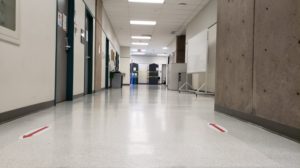Change is the only constant, but, in some ways, things don’t change too much. It’s a horrible cliche, but it’s true. What I’m getting at is that we’re in for another rocky fall semester.
The false starts are taxing. Economically, we need to buy into it—literally—but I’m getting to a point where I want to take control of my own life. And my bet is that regardless of the direction a student might lean politically, they want the same.

Taking control might look a bit different for each person. If we put the details of the last two years to the side and look at what’s been happening in BC—things open up in the summer and go south in the fall—would that be ideal or at all desirable to live with in years to come? No, definitely not. But if it was the understanding among everyone, we would better be able to adjust. The economic damage would lessen and we could say goodbye to these exhausting false starts. But that’s just not how it’s going to be.
When I rolled up my sleeve for my second shot on August 1, a heavy, sad feeling engulfed me. There was a time, when vaccines were coming, when I was feeling upbeat about the whole COVID situation. But now we’re realizing that while vaccines are imperative, they may not be the be all end all of the pandemic. No one ever said they were, but we had to find hope where we could.
Two weeks later, I knew I was the most protected I could be, but I also knew that we still have a long way to go, and that announcements of a normal fall were a best-case scenario that we believed, perhaps, because we had to. Because we are sad about how things are.
Hospitalizations and cases are rising for children and young people, who are obviously a large portion of those at school. Prime minister Justin Trudeau has committed to Canada buying 40 million doses of the Moderna COVID-19 vaccine over the next two years. Let that sink in.
Prediction: there is absolutely no way the fall will be a full return to normal, regardless of vaccine status. And part of that is because we haven’t yet had time to adjust back to normal. It’s only been 18 months, but it feels like forever.
But it’s time.
Let me say it again: it’s time.
It’s time to adjust and accept that we’ve been fighting disease for centuries, and will continue to fight it in years to come, and that still we don’t actually know what “normal” means. It’s time for that to change, because the stench of permanent Sharpie fills the room, and the writing on the wall has never been clearer: there is no simple solution to end this pandemic.
